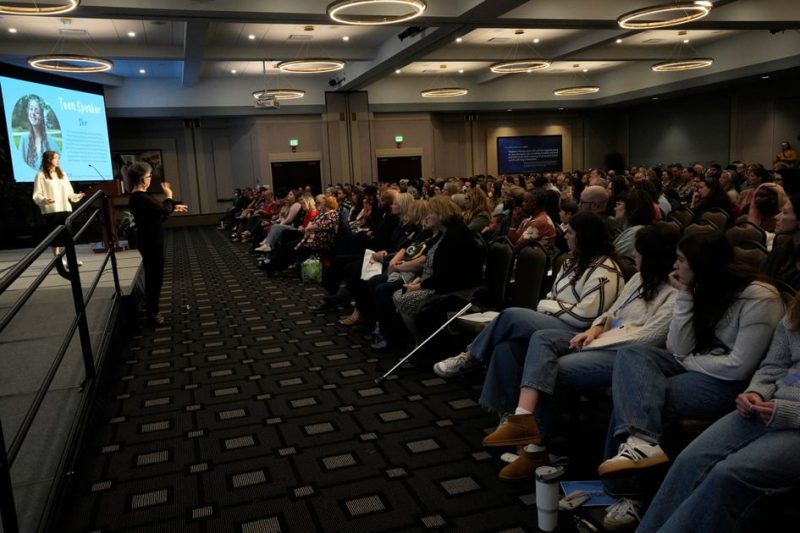
At Milwaukee Friendship Circle, Teens Are Breaking the Silence on Mental Health
by Ellen Braunstein – chabad.org
There is no greater Jewish cause than protecting the sanctity of human life. That’s why the Friendship Circle of Wisconsin, under the auspices of Chabad-Lubavitch of Wisconsin, is addressing this issue by providing prevention training at no cost, support groups and by opening the conversation to Milwaukee locals.
Rabbi Levi Stein, who co-directs the Friendship Circle of Wisconsin with his wife, Leah, is passionate about mental health and the prevention of suicide. In response to what he sees as a growing epidemic, the rabbi has unveiled plans to train 1,000 people in suicide prevention using the SafeTALK program. The goal is to reach that number between now and this Sept. 10, which is Suicide Prevention Day. Participants who have already taken the four-hour training course range from concerned teenagers to seasoned first responders.
SafeTALK (Suicide Alertness For Everyone) is a program that teaches individuals signs to recognize people in need of help and provides tools on how to assist. Participants learn how to apply the TALK steps (Tell, Ask, Listen, Keep Safe) to help someone who may be facing such a crisis. They also learn how to connect the person with community resources, such as healthcare professionals, first responders or crisis-line workers.
Stein anticipates that to reach their goal, they will require 41 SafeTALK training sessions. The number is, of course, a logistical one, but it also holds special meaning for the Milwaukee Jewish community: It pays tribute to Jonathan Brostoff, a Jewish Milwaukee alderman, an active participant at Chabad and Friendship Circle volunteer who tragically took his own life on Nov. 4, 2024, at the age of 41.
Brostoff’s death “hit very close to home,” said Stein. “Jonathan helped us get a lot of our mental-health programming off the ground at the start. In his memory, we are inspired to take it to a whole new level to continue his legacy.”
Friendship Circle Wisconsin is a social-service organization providing opportunities of inclusion and friendship for children and individuals with special needs, with an additional emphasis on connecting them with teen volunteers. They opened their UMatter division in 2021 to deal exclusively with mental health. For the past few years, UMatter has been empowering teens across the state to support their peers who struggle with isolation while teaching individuals in need that there is strength in seeking help.
“We teach students and adults how to recognize when someone is having thoughts of suicide, how to ask about suicide, how to be a good listener and, most importantly, how to get them help,” said Stein, who is himself an accredited SafeTALK trainer.
Besides training programs, UMatter provides support groups for teens and parents, as well as mental-health events and podcasts. “It’s changing lives every day,” Stein said. “Suicide is the second leading cause of death for people ages 13 to 25. It’s a crisis. In Wisconsin alone, two to three people die by suicide every day; that’s 900 last year.”
“We have to do something to arrest this trend,” he stated.

‘To Heal Themselves and to Help Others’
This month, Lindsay Goldner, a Milwaukee marketing executive, commemorated her 38th birthday by gathering 38 mothers for a SafeTALK training. Goldner became involved with Friendship Circle because she liked “the mission and vision of everything they are trying to accomplish. They’re destigmatizing things, any sort of disability, mental health, in general.”
When they announced their new initiative to battle mental-health stigmas, Goldner knew she wanted to get involved.
Goldner was one of more than 500 attendees at the November event with high-school-aged speakers sponsored by UMatter. Participants young and old heard speakers share their stories of overcoming mental-health struggles.
Teenager Shir Posner was one of the speakers who enthralled listeners. Shir described to the crowd her journey with serious depression and how during the pandemic she mistakenly turned to social media for comfort.
“My main message was that you never know what someone is going through. So, you shouldn’t compare yourself to others behind the screen you think are better off than you,” she said. “It’s taken a toll on my life for sure. It’s a daily struggle that I have to deal with and a lot of ups and downs.”
Posner began what she thought were innocent at-home workouts that were trending on social media during the pandemic; it wound up escalating into an obsession with food restriction and excessive exercise, taking a severe toll on her health.
Through UMatter, the 16-year-old ultimately succeeded in adopting healthier eating and exercise habits, and discovered a renewed sense of community and fulfillment.
“Children struggle with their mental health, and we want to help break the stigma,” Stein said. “There’s a lack of opportunity for our youth to have a voice. This event gives an opportunity for all teens that are in attendance to be inspired by presenters who are just like them, and know they are not alone if they are struggling with anything similar.”
Stein added that he is inspired that “so many people are coming together for such an important reason.”
Shir said that not many communities are doing something as impactful as Chabad: “I think their advocacy for mental health is extremely impactful for people of all ages. Their message is you shouldn’t be quiet about mental health and everybody deserves a chance in this world.”
Sophia Edelstein, a junior at University of Wisconsin-Milwaukee, was the event coordinator for the program, titled “One Thing I Wish You Knew.”
“It was truly inspirational to hear peers speak on such a vulnerable topic that is not highlighted enough in the media,” she said. “They felt like they had a friend. In order to heal themselves and help others, the teens chose to take this on.”











